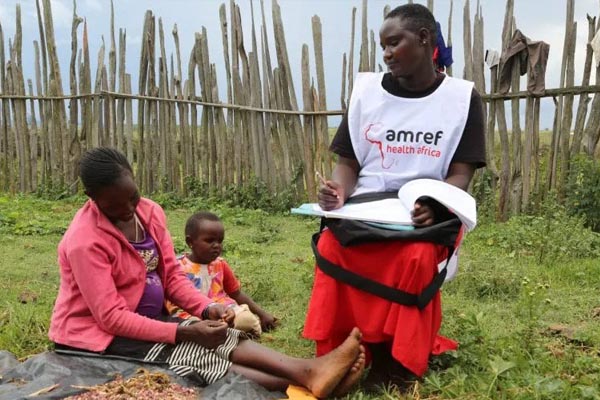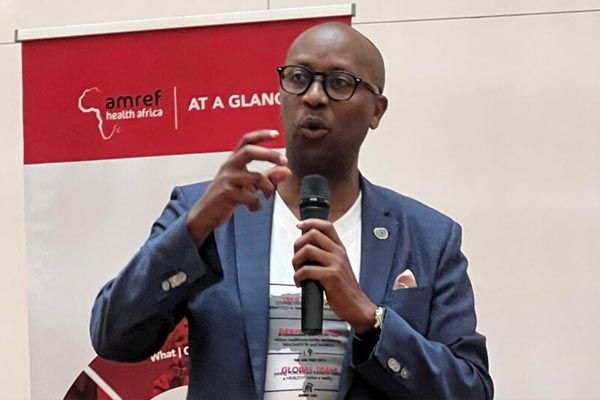#13
Amref
Amref Health Africa is the flagship sub-brand of the AMREF Brand.Amref Health Africa is the largest African-based and African-led health non-governmental organization (NGO) in the world. Officially founded in Kenya in 1957 to deliver mobile health services and provide mission hospitals with surgical support, the organization has through the decades evolved to become one of the most respected and influential players in Africa’s healthcare scene.
Amref Health Africa runs more than 150 healthcare programs in over 35 countries in Africa, including Kenya, where it is headquartered, Tanzania, Uganda, Ethiopia, Zambia, South Africa, Nigeria, Ghana, and Senegal, among other countries on the continent.
The Nairobi-based NGO’s intervention areas include communicable and non-communicable diseases; health systems strengthening; maternal, newborn and child health; sexual reproductive health and family planning; water sanitation and hygiene; neglected tropical diseases; public health emergencies; policy and advocacy; universal health coverage; and research and health innovation.
Amref has strong partnerships with local governments, health ministries and other implementing public sector and private sector partners across Africa. In 2020, its projects on the continent reached 7.8 million people directly and 30.4 million others indirectly, its Annual Report 2020 notes.
Amref Health Africa runs fundraising offices in major cities in Europe and North America. It has a diverse donor base that includes the Global Fund, US Agency for International Development (USAID), United Nations Children’s Fund (UNICEF), United Nations Population Fund (UNFPA), the US Center for Diseases Control (CDC), among other prestigious donor organizations. It also has a small but vibrant base of private donors.

Community-based approach
Amref Health Africa’s approach is unique because, even though the organization is backed by global expertise, local government support, and donor funding, it leans on the strength of local communities to deliver successful interventions.
Amref’s response to healthcare needs in Africa is grounded in community engagement and delivered with the help of community health workers (CHWs). The organization today has one of the most extensive CHW networks in Africa.
In the African context, most people – especially the majority of those who live in rural areas and urban slums – don’t have access to the formal health system. This is usually due to affordability issues, underinvestment in public health facilities outside urban areas, and human resource gaps in public health systems. Official data indicates that the doctor to patient ratio in Kenya, for example, is one to 16,000, a figure far below the World Health Organization’s recommended one to 1000. The situation is similar if not worse in many other African countries.
CHWs therefore play an important role in bridging the gap between their communities and the formal health system. CHWs typically provide a range of preventive, promotive and curative health services. Examples include maternal, newborn and child health; communicable disease control; mental health services; sexual and reproductive health care; and non-communicable disease prevention and control. CHWS bring healthcare as close as possible to where people live and work.
Despite the vital role CHWs play in Africa’s health system, majority are unpaid and lack formal recognition. Little attention is also given to their training and development. Amref Health Africa has fiercely challenged this model, terming it as outdated.
Amref Health Africa has been at the forefront in advocating for recognition and remuneration of CHWs throughout Africa. It has also trained more than 100,000 CHWs in Africa using its digitally enabled learning platform, LEAP.

Amref’s approach of using community engagement and local CHWs networks to create lasting health change in Africa has earned it global admiration, including from peer NGOs and the donor community. For example, The Geneva, Switzerland based Global Fund, one of Amref’s donors, states: “Amref Health Africa has shown that indigenous solutions based on international science can address the toughest problems in the world and serve as a beacon for Africa and for the world.”
Driving thought leadership
Amref Health Africa has emerged as one of the foremost thought leaders on public health in Kenya and Africa. This is in no small part thanks to the leadership of Dr. Githinji Gitahi, the organization’s Group CEO.
Dr. Gitahi, who joined Amref Health Africa in 2015, has proven to be an articulate and indefatigable health policy advocate with a knack for public communication. At the onset of the Covid-19 pandemic, he stepped up his activities on traditional and social media and quickly emerged as one of the most authoritative experts on the pandemic.

Dr. Gitahi played a critical role in arming the public with reliable information about the pandemic, especially in the first few months when disinformation and fear mongering hindered an effective public response to the outbreak. He has also played an instrumental role in ensuring Covid-10 vaccines are available and administered across Africa.
It therefore came as no surprise to many when Dr. Gitahi was in 2021 appointed as a commissioner in the Commission on African Covid-19 Response. The appointment was made by H.E. Cyril Ramaphosa, the African Union Champion on Covid-19 and President of South Africa.
The Amref Health Africa CEO is also a member of the Private Sector Advisory Board of Africa CDC and of the World Health Organization’s Community Health Worker Hub. He is the only Kenyan to be appointed to the Board and Scientific Advisory of Coalition for Epidemic Preparedness Innovations (CEPI). He was appointed to CEPI in 2022. CEPI is a body of eminent global health experts that aims to stop future epidemics by developing new vaccines.
Dr. Gitahi has also leveraged his strong media presence to drive awareness about Universal Health Coverage, a subject he is passionate about. He has commonly said that for him, UHC is first and foremost a conversation about human rights and justice, rather than a set of policy interventions. “The first step towards addressing the health challenges of our time is for people to understand and appreciate that health is a basic human right,” said Dr. Gitahi, who says that UHC must be pro-poor to work.
Another key pillar of Amref Health Africa’s thought leadership strategy is the Africa Health Agenda International Conference (AHAIC). Since 2014, Amref has organized AHAIC biennially. AHAIC is widely viewed as the premiere platform that brings together experts from countries across the continent and around the globe to discuss African solutions to Africa’s most pressing health challenges. The 2019 AHAIC in Kigali managed to convene more than 1,500 policymakers, civil society, technical experts, innovators, thought leaders, scientists, and youth leaders.
Evolving organization
For all its achievements and rich heritage, Amref Health Africa is an evolving organization. While it remains an NGO, it has progressively expanded its presence in social enterprise, research, and education. Its subsidiaries include Amref Flying Doctors, Amref Health Enterprises and Amref International University.

Amref Flying Doctors (AFD) became an essential link in the COVID-19 response. Besides transporting ill patients, AFD was involved in transporting medical equipment as well as specimens for laboratory testing. As the only accredited Air Ambulance service provider in the region, AFD partnered with the Government of Kenya, through the Ministry of Health, to offer logistical support for the movement of medical personnel and delicate medical equipment to far-flung areas.
During the pandemic, Amref International University (AMIU) developed strategies for continuity of learning for existing programmes by enhancing its blended learning approach. This resulted in a doubling of student enrolment–from 490 in 2019 to 809 in 2020. The University also undertook several research studies to inform policy and interventions. Moreover, three new Bachelor of Science (BSc) programmes were approved by the Commission for University Education (CUE) in 2020 bringing the total number of BSc programmes to five.
















